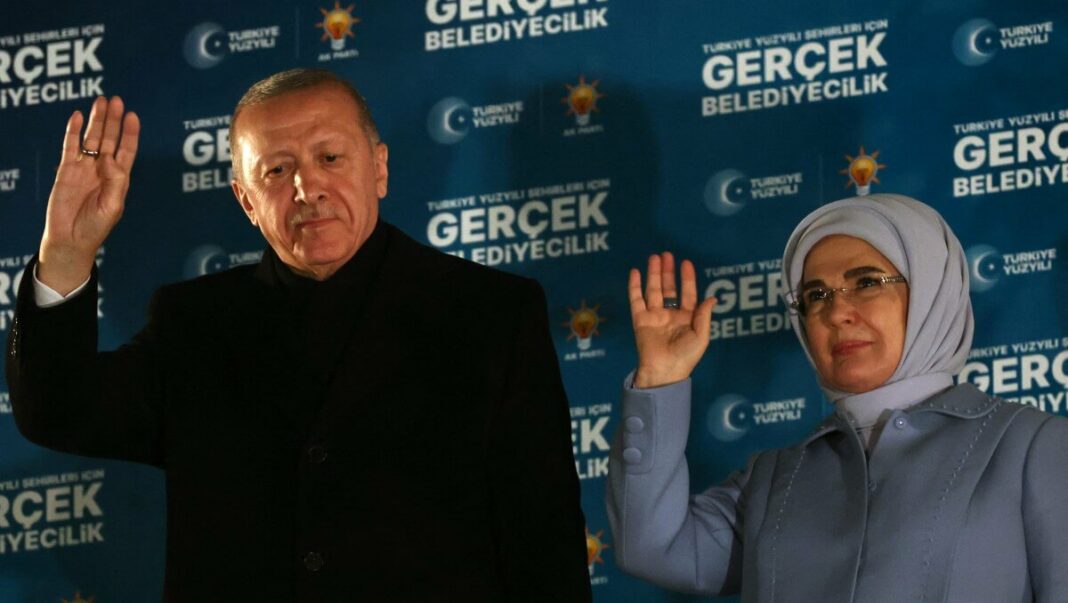Recep Tayyip Erdoğan’s opponents may have celebrated Sunday’s local election hammering of the Turkish president as if they’d unseated him, but the “reis,” or chief, still has at least four years of power ahead.
It was a rare defeat for the 70-year-old Erdoğan, in power for 21 years and re-elected last May with over 52 percent of the vote — albeit after competing in his first-ever run-off.
The president personally poured energy into the municipal election campaign in the hope of re-taking İstanbul, leaving voters to identify his party’s failures with Erdoğan himself.
The Islamic conservative Justice and Development Party (AKP) controls none of Turkey’s major cities and has even lost provinces and municipalities once thought impregnable to the secular, center-left Republican People’s Party (CHP).
Nevertheless, “as a seasoned politician, [Erdoğan] will adjust,” said Oxford University political scientist Dimitar Bechev, noting that “co-existence with mayors is already tried and tested.”
Some observers had prematurely predicted his political exit when AKP lost the İstanbul and Ankara mayorships in 2019.
Erdoğan himself said on Sunday evening that “we will work with the mayors who have won” and called on his own camp to engage in “self-criticism.”
The president’s calm speech to a crowd of shaken supporters surprised observers, as he straightforwardly accepted the opposition surge, calling it a “turning point” for the AKP.
He later dismissed speculation that he might call early elections to cling to his presidential mandate for a little longer.
“Turkey has more than four years’ worth of treasure ahead of it. We cannot waste this period with discussions that will waste the time of the nation and the country,” Erdoğan said.
‘Bet on nationalism’
With 265 seats, the AKP remains by far the strongest force in the 598-seat parliament, and its alliance with the far-right Nationalist Movement Party (MHP) brings its seats in parliament to 314.
There are limits to the majority’s power: It lacks the numbers to amend the constitution to allow Erdoğan to run for president again in 2028.
Nor would there be much interest in Erdoğan’s parliamentary allies dissolving the chamber for fresh elections since the leader “has lost the ability to attract voters from outside his ranks,” said Ahmet İnsel, a Turkish political scientist living in exile.
For now, Erdoğan is likely to play the international statesman, he predicted, with an upcoming visit to Joe Biden’s White House on May 9.
“He’ll be able to keep things afloat until 2028, but beyond that it’s compromised. … There’ll probably be a transfer of power” to the opposition, said Bayram Balcı of Paris’ Sciences Po University, adding that “without Erdoğan, there’s not much to the AKP.”
On the other hand, in a volatile region between Europe and the Middle East, “there’s a lot that could happen with Syria, Iraq or Russia” over the coming four years, “including on the internal security front.”
Erdoğan was already talking tough late Sunday, warning that he “will not allow a ‘Terroristan’ on [Turkey’s] southern borders,” Insel pointed out.
The president may “bet on nationalism and the vital battle against terrorism, which the CHP will find hard to oppose,” he added.
Turkish warplanes on Monday bombed positions of the outlawed Kurdistan Workers’ Party (PKK) in northern Iraq, a group branded as terrorists by Ankara and Turkey’s Western allies.
© Agence France-Presse


